Bṛhat Śānti
This stotra (hymn, verse in praise of) is primarily composed in Sanskrit except for one verse which is in Prakrit. It is believed to have been composed by a Jain ascetic, Śānti Sūri. It has been mentioned in an ancient scripture composed around 1300AD.
This stotra is often recited after auspicious religious rituals and after important life events in one’s life (e.g. birth, marriage, prayers for departed ones, etc). There are two main prayers for peace, Bṛhat (in Sanskrit meaning wide, large, big, extensive) and Laghu (in Sanskrit meaning small, light). Common parlance refers to these prayers as Moti Śanti (“big” Śānti) and Nani Śanti (“small” Śānti) respectively.
The prayers begins by mentioning the ritual of bathing the new born Tirthaṅkar (simplistically can be considered as “Jain God” though more appropriately a ford maker who achieves liberation and illustrates the path to others) at Mount Meru by heavenly celestial beings.
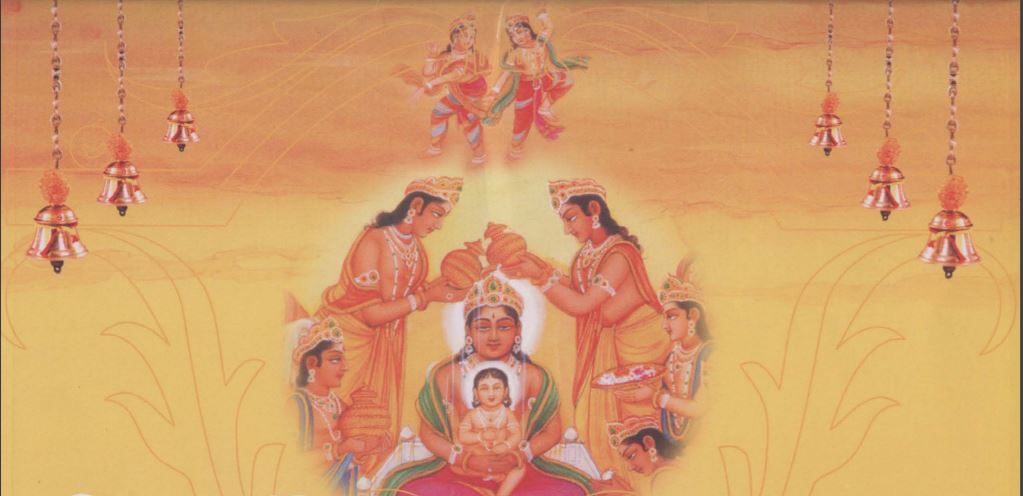
The prayer mentions the names of all the 24 Jain Tirthaṅkaras, 16 goddesses and nine planets (in Jain astronomy it is believed that planetary movements can effect ones’ life) and thus seeking and wishing for universal peace to prevail.
The style of the prayer is as though it is giving instructions to a priest on how to perform the bathing ritual and the merits one accrues in doing so.

Bho Bho bhavyāh: śŕnuta vachanam prastutam sarvametad,
Ye yatrayām tri-bhuvanguro-rārhatā ! Bhakti-bhājah:
Tesham śāntir –bhavatu bhavatā marhadādi prabhāvā
Dārogya-shri-dhŕti-mati-kari klesha vidhvan sahetuh:

Oh! noble souls! Listen to ceremonial hymn that I will be presenting to all the Arhant devotees gathered in the Lord’s procession. Due to the glory of the Arhats who are Guru of the Three Worlds & heavenly beings, may you attain good health, wealth, spiritual zest and steadfastness and wisdom. Also may this prayer be conducive to destroy your attachments, aversions & pain.

Bho Bho bhavya-lokā ! iha hi bharat-airāvata-videha-sambhavānām
samasta-teertha-kŕtam janma-nyāsana prakampānantara-mavadhinā
vignāya Saudharmā-dhi-patih: sughosāghantā chālanā-nantaram, Sakalasurā-surendraih: sahasamāgatya, savinayamarhad-bhattārakam Gŕhitvā gatvā kanakādri shŕngge vihitajanmā-bhishekah: Śantimudghoshayati yathātatoham “kŕtānu-kaar-mitikŕtvā, mahājanoyenagatahsapanthāh: ”Itibhavya-janaih: sahasametyasnātra-peethesnātramvidhāyaśānti mud-ghosha-yāmi, tat pooja-yātra-snātrādimahotsvā-nantara-mitikŕtvā karnam datvānishmya-tam, nishmya-tam svāhā
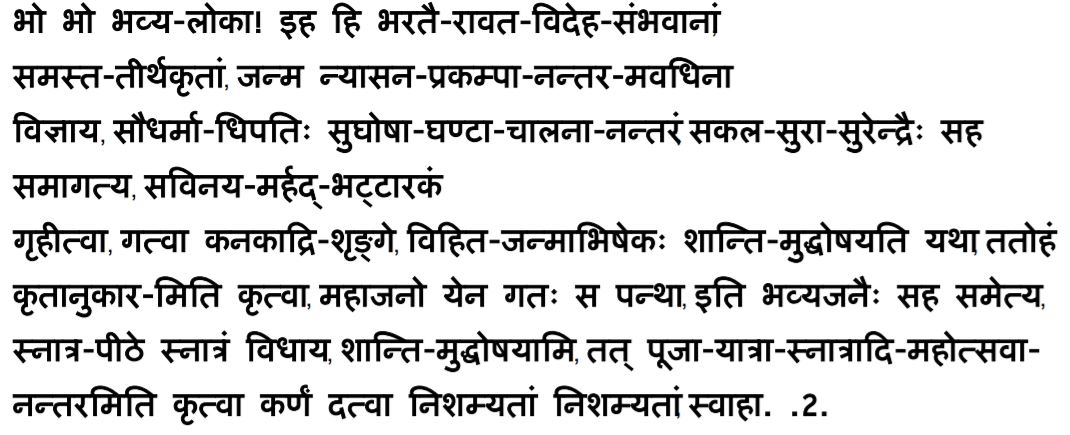
O Noble Souls! When the Tirthaṅkaras in Bharat, Airāvata or Mahāvideha within the Adhi Dvipa (two and half continents) are born, Sudharma’s (the celestial Indras (angels)) throne shakes and with Avadhi Gyāna (clairvoyant knowledge) realises that an enlightened soul is born. He then rings the majestic bell (sughoṣā) and all the heavenly damsels, god & godesses get ready to go where the Tirthankar is born. With utmost humility they take the newly born child in their hands to the peak of Mount Meru for the bathing ceremony.
After performing the bathing ceremony, they proclaim peace. I, too, recite the song of praise today as it is customary to follow the path of great, noble souls. Together with all pious souls gathered, after performing the snatra ceremony on a snatra pedestal, I too proclaim peace. Therefore, after performing complete ablation through pooja (ritual), yatra (procession) and snatra (bathing ceremony) listen attentively!.
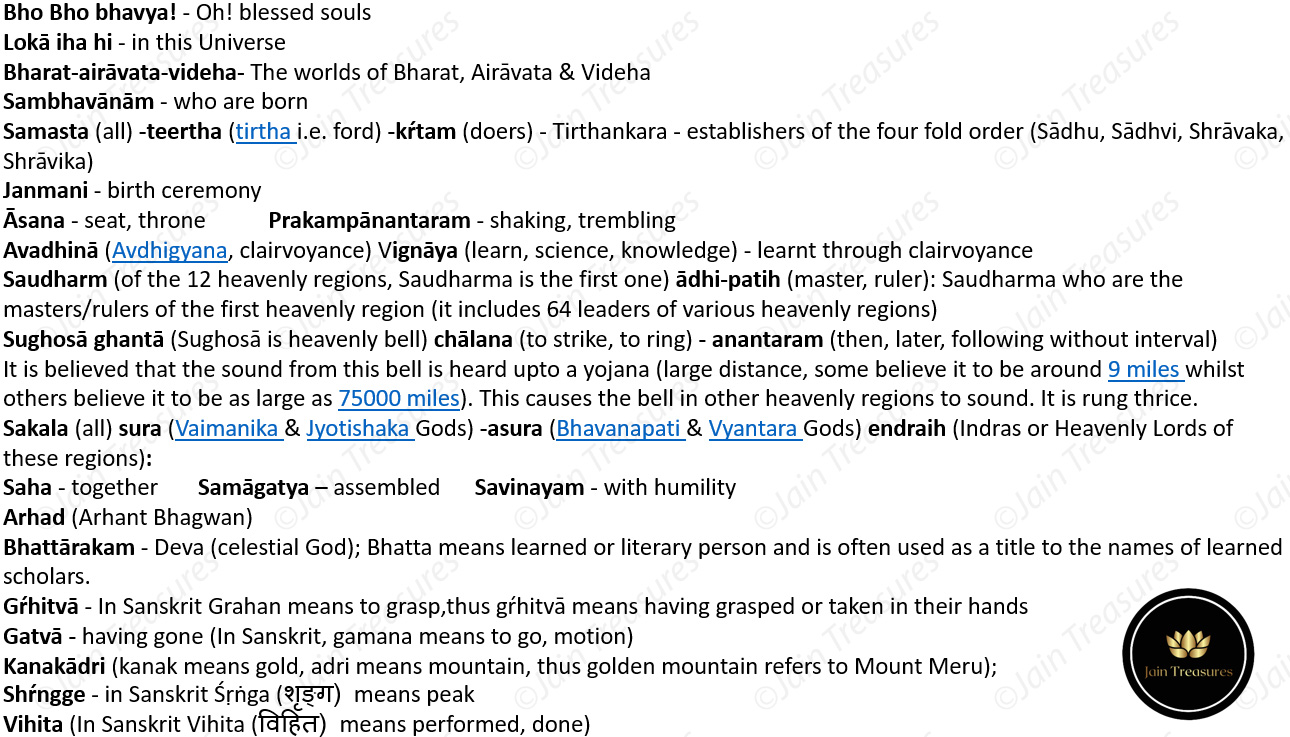
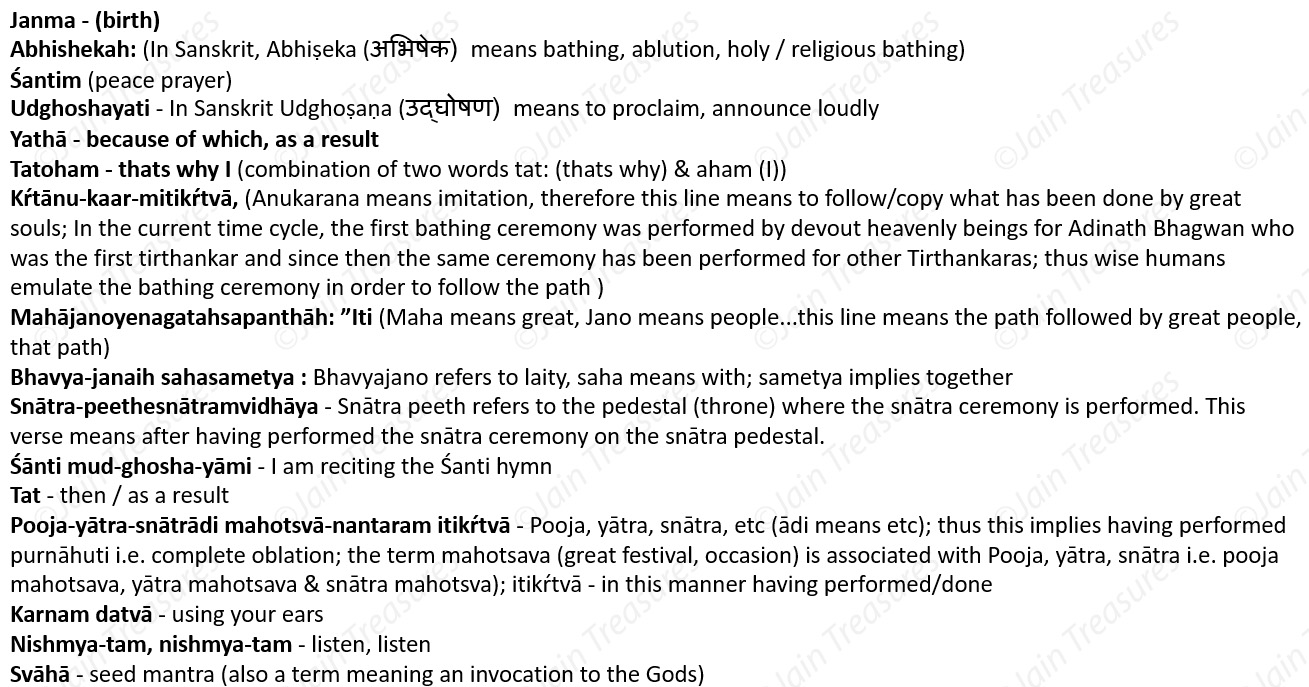
Auṁ punyāham punyāham, preeyantām preeyantām bhagvantor-hantah:
Sarvagnyaha: Sarva-darshina stri-lok-nāthā, stri-lok-mahitā, stri-lok-poojyā, Stri-loke-shvara, stri-loko-dyotakārah:

Aum, today is a day of merit. May all nice and beneficial things happen to us. Let the Arihants be pleased with us, who have the following qualities:
- Divine
- Omniscient
- All seers
- Enlighten the three worlds
- Lords of the Three Worlds
- Worshipped by the inhabitants of the Three Worlds
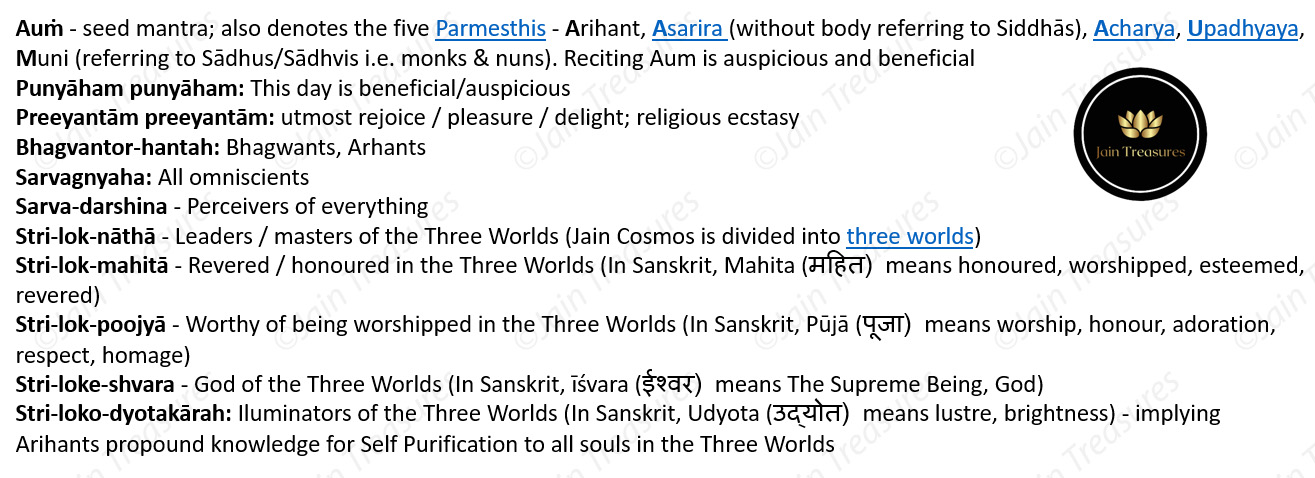
Auṁ Ṛṣabha – Ajita-Sambhava-Abhinandana-Sumati-Padmaprabha- Supārśva -Chandraprabha-Suvidhi- Śheetal – Śreyāṅsa – Vāsupūjya -Vimala-Ananta-Dharma- Śānti -Kunthu-Ara-Malli-Munisuvrat-Nami-Nemi- Pārśva – Vardhamānānta Jinah: śantah: śantikarā bhavantu svahā

Let Ṛṣabha, Ajita, Sambhava, Abhinandana, Sumati, Padmaprabha, Supārśva, Candraprabha, Suvidhi, Śheetal, Śreyāṅsa, Vāsupūjya, Vimala, Ananta, Dharma, Śānti, Kunthu, Ara, Malli, Munisuvrat, Nami, Nemi, Pārśva & Vardhamāna (names of all the 24 Jain Tirthaṅkaras) grant peace.

Auṁ munyomuni-pravarāripu-vijaya durbhiksha kantāreshu durgamargeshu Rakshantu vo nityam svahā

Let all the great seers and disciples of Tirthaṅkaras grant you victory over your enemies (internal) and protect you during the time of famine, in dreary jungles and on dangerous paths.

Auṁ, Hriṁ, Śriṁ, dhŕti-mati-kirti-kanti-budhi-laxmi-medhā-vidyāsadhan praveshnivesh-neshu sugŕheet nāmāno jayantu te jinendrāh:

Victory to the Jinendras, whose names are worth remembering in the auspicious mantras such as Auṁ, Hriṁ, Śriṁ (glory, beauty), Dhŕti (patience, perseverance), Mati (intellect), Kirti (fame), Kanti (brilliance, lustre), Budhi (intellect), Laxmi (wealth & prosperity), Medha (wisdom), etc.

Auṁ Rohiṇī, Prajñapti, Vajra- śṛṅkhalā, Vajrāṅ-kuśi, Apratichakrā, Puruṣadattā, Kāli, Mahākāli, Gauree, Gāndhāri, Sarvāstrā, Mahājvālā, Mānavi, Vairoṭyā, Acchuptā, Mānasi, Mahā-mānasi, shodasha vidyā devyo raksantu vo nityam svahā.

Auṁ …Let Rohiṇī, Prajñapti, Vajra- śṛṅkhalā, Vajrāṅ-kuśi, Apratichakrā, Puruṣadattā, Kāli, Mahākāli, Gauree, Gāndhāri, Sarvāstrā, Mahājvālā, Mānavi, Vairūṭyā, Acchuptā, Mānasi, Mahā-mānasi: these 16 demi-Godessess of knowledge always protect you.
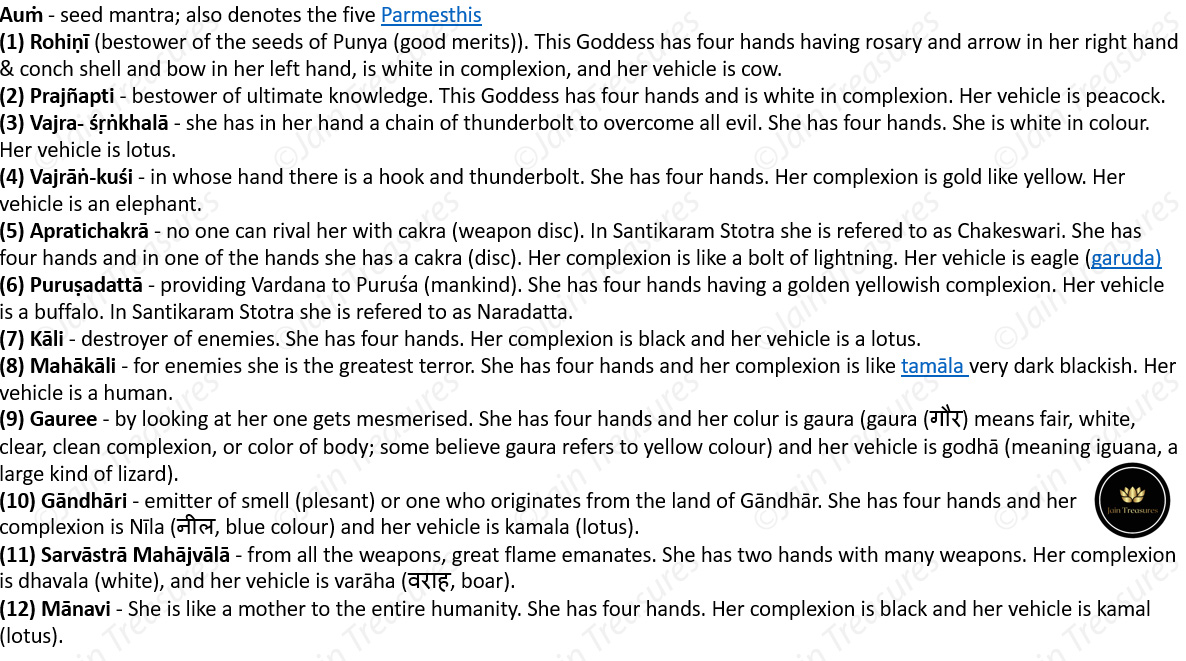

Auṁ Āchāryo-pādhyāya prabhṛti chātur-varnasya Shree shraman sanghasya Śantirbhavatu , Tustirbhavatu, Pustirbhavatu

Auṁ … May Ācārya, Upadhyāya and the Four fold sangh (monks, nuns, male & female laity) attain peace, contentment and spiritual growth

Auṁ grahā-shchāndra, Sūryān-gāraka, Buddha, Bṙhaspati, Śukra, Śanai-shvar, Rāhu, Ketu sahitā: sloka pālāh, Soma, Yama, Varuṇa, Kubera, Vās-vāditya-Skanda- Vināya-kopeta ye chānyepi grām nagar kshetra-devatā-dayaste sarve preeyantām preeyantām, aksheena-kosha-koshtthā -gārā nara-pataya tashva bhavantu svāhā

Auṁ … Nine plants – May all the heavenly beings of Candra (moon), Sūrya (sun), Aṅgāraka (Mars), Buddha (Mercury), Bṛhaspati (Jupiter), Śukra (Venus), Śani (Saturn), Rāhu & Ketu including the four guardians of these worlds: Soma, Yama, Varuṇa & Kubera & guardian Gods: Vāsava, Skanda, Vināyaka, Gaṅeśa & other Gods of other places, villages, towns etc be pleased and grant us boons. Also let the treasury and food stores (silos) of the rulers remain inexhaustible.
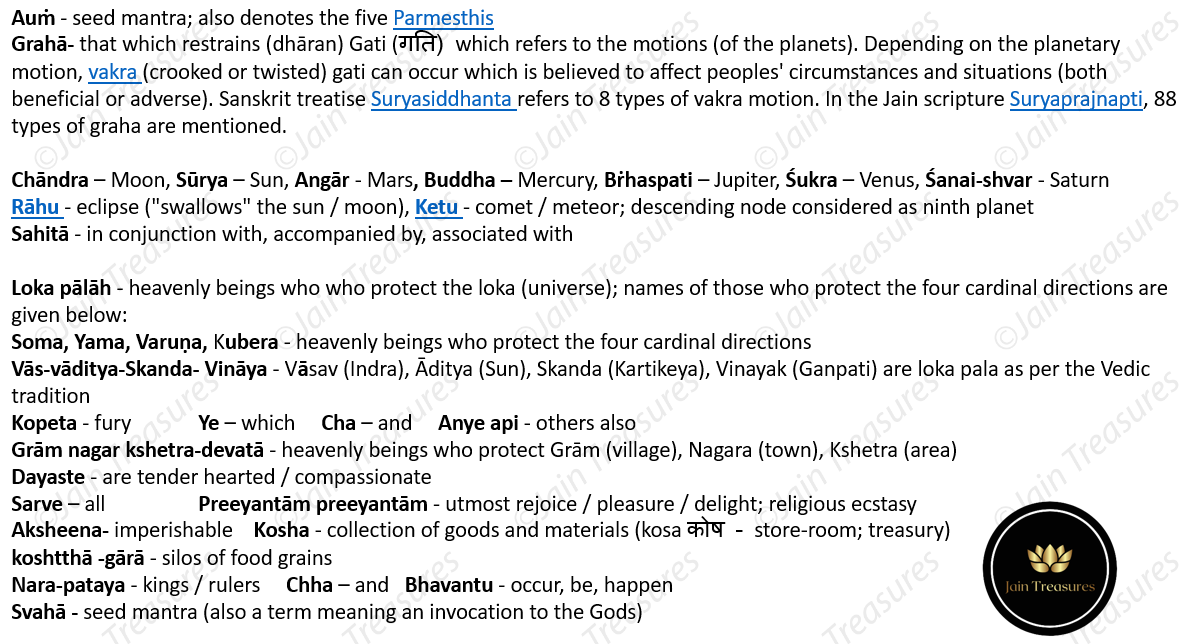
Auṁ putra, mitra, bhratŕ, kalatra, suhŕt, svajana, sambandhi, bandhu varga sahitā Nityam chāmoda-pramoda-kārinah: asmin-shcha Bhoomandalā-yatana nivāsi-sādhu-sādhvi, shrāvaka-shrāvikānam, rogo-pasarga-vyādhi-duhkha-durbhiksh daurma nasyo pashama-nāya shantir bhavatu

Auṁ … Let all children, friends, spouses, allies, family members and society be happy and give happiness to others. Let all diseases, obstacles / impediments, pains, miseries, famine and instabilities of all ascetics and laity be removed / destroyed.

Auṁ tushti-pushti-ŕddhi-vŕddhi māngalyot-svāh: sadā prādur-bhūtāni pāpāni shāmyantu duritāni shatravah parānmukhā bhavantu svāhā

Let there be satisfaction, prosperity, growth and increase in energy, wealth and welfare. Let there be celebrations and joy. Let all sins and vices be destroyed. Let all enemies turn their backs and depart.

Shrimate Śānti nāthāya namah: Śānti vidhāyine trailokya-syā marādheesha mukuta-bhyar chitan-ghraye

I bow down to Lord Śāntināth who possesses the true wealth of knowledge, who is the bestower of peace in the three worlds and even the crown of Indra worships His feet when Indra bows down to pay obeisance.

Śāntih: Śānti-karah: shreemān Śantim diśatu me guruh: Śāntireva sadā teshām yeshām śāntir gŕhe gŕhe

Śāntinath Bhagwan who bestows peace to the universe, propounds religion to the world, is worthy of veneration (Pujya) – please grant me peace. In all houses where Lord Śāntinath is worshipped, peace will always prevail there.

Unmṛṣṭa-rishta-dushta, graha-gati-duhasvapna-durni mittādi, sampādita-hita-sampan-nām-grahanam jayati śānteh:

Recitation of the blissful name of Lord Śāntināth removes bad omens, evil effects of planetary motions, nightmares, adverse situations or circumstances, etc. and helps to attain victory to realise one’s own soul and obtain material wealth.

Shree sangha, jagaj-janapada, rājadhipa, rāj-sannive-shānām, goshtthika, pur-mukhyānām vyāhara-nair vyāhare-chchhāntim

This “stotra of peace” should be recited after mentioning the details of the gathering (e.g. Jain organisation, sect, country, subject of any Kings or Queens, all dignitaries, important personalities, leaders, etc)

Shree shramana sanghasya Śāntir bhavatu
Shree jana-padānām Śhāntir bhavatu
Shree rajā dhipānām Śhāntir bhavatu
Shree raja-sanniveśānām Śāntir bhavatu
Shree goshtthi-kānām Śāntir bhavatu
Shree paura-mukhyānām Śāntir bhavatu
Shree paura-janasya Śāntir bhavatu
Shree brahma lokasya Śāntir bhavatu
Om svāhā Om svāhā, Om Shree Pārśva nāthāya svāhā
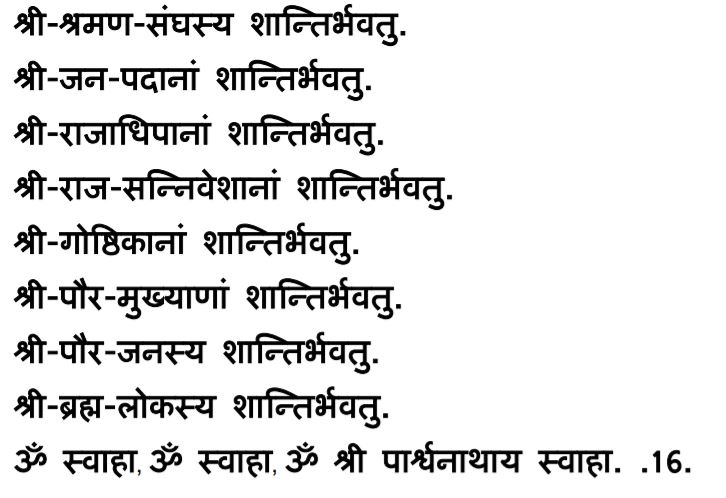
Let there be peace within the entire community, let there be peace in the entire country & world
Let there be peace amongst all leaders, rulers, Kings & Queens, all dignitaries
Let there be peace amongst all worshippers and people living in townships
Let there be peace in the entire Universe
Pārśvanāth Mantra preceeded and followed by Beej Mantras.

Eshā Śāntih: pratishtthā yātrā snātrādhavasāneshu Śānti kalasham gŕheetvā kunkum-chandan-karpurā garu dhoop vāsa-kusumānjali sametah: snātra chatushki-kāyām Shree sangha sametah: shuchi shuchi vapuh: pushpa-vastra-chandanā bharanā-lankŕtah: pushpa-mālām kantthe kŕtvā Śānti muddghosha-yitvā Śānti pāneeyam mastake dātavya-miti

This hymn should be recited at the time on installation of images in temples, during pilgrimages and after rituals such as snātra pujā. Take a śānti kalasa (a jar used to perform this ritual), kumkuma, candana (sandalwood), kapūra (camphor), dhūpa (incense), flowers and then stand in the altar (mandapa) after wearing white clothes and free from all internal and external dirt, adorned with ornaments wearing a garland of flowers around the neck. Having recited this hymn, sprinkle the water from the holy jar on everyones head.

Nṛtyanti nṛtyam mani-pushpa-varsham, sŕjanti gāyanti cha mangalāni;
Stotrāni gotrāni patthanti mantrān, kalyān-bhājo hi jinā-bhiśeke.

Fortunate and blessed souls during the snātra (bathing ceremony) of the Jineśwarās: dance, shower/offer jewels and flowers, recite auspicious stotrās (prayers) including the lineage of the Tirthankaras and mantras.

Shivamastu sarva jagat:, parhit-niratā bhavantu bhūtganāh
Doshāh prayāntu nāsham, Sarvatra sukhi bhavantu lokāh:

Let the entire universe be blessed,
Let all beings be engaged in each others’ well being,
Let all weakness, sickness and faults diminish and vanish
Let everyone, everywhere be blissful and at peace.

Aham titthayara māyā Sivādevee, tumha nayara-nivāsinee,
Amha sivam tumha sivam, asivo-vasamam sivam bhavatu svāhā

I am Māyādevi, mother of Tirthankar Neminath, residing in your town and wishing me and everyone happy and auspicious life. May all difficulties disappear and happiness prevail upon worshipping Jineśvarā.
This is the only verse in Prakrit. All the rest are in Sanskrit. This verse seems to imply that Māyādevi has come to the city where this ritual is being performed and praying for all obstacles to be removed. Some people believe that Māyādevi may have composed this hymn.

Uppasargāh: kshayam yānti, chhidyante vighna-valayah:
Manah: prasannatāmeti poojya māne jineshvare

Let all obstacles perish
Let all difficulties be removed
Our mind attains peace and happiness on worshipping the Jineśvarās.

Sarva Mangal Māngalyam, Sarva Kalyān Kāranam
Pradhānam Sarva Dharmānam, Jainam Jayati Shāsanam

Let the Jain sasana (doctrine) which is the principal / predominant of all philosophies, be victorious as it is the most blissful and cause of everybody’s welfare.

References:
- Prabodh Tika by Param Pujya Panyas BhadrankarVijayji Maharaj & Param Pujya Munishree Kalyanprabhavijayji Maharaj
- Nava Smaraṇa by Dr. Vinodbhai Kapashi
- Internet
If there are any errors or misinterpretation of the verses, I seek pardon for my ignorance.